-
 From Usage in Skincare to Treating Wounds Quickly, Castor Oil Has a Lot of Applications You May Have Never Heard of: Benefits of Using Castor Oil (2021)
From Usage in Skincare to Treating Wounds Quickly, Castor Oil Has a Lot of Applications You May Have Never Heard of: Benefits of Using Castor Oil (2021)
-
 Make the Miraculous Neem Oil a Part of Your Daily Life: Discover the Numerous Uses of Neem Oil and How It Can Give You a Radiant Skin, Lustrous Hair and Overall Health and Wellbeing! (2021)
Make the Miraculous Neem Oil a Part of Your Daily Life: Discover the Numerous Uses of Neem Oil and How It Can Give You a Radiant Skin, Lustrous Hair and Overall Health and Wellbeing! (2021)
-
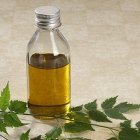 Ever Considered Neem Oil for Hair? Here is Why You Have to in 2020!
Ever Considered Neem Oil for Hair? Here is Why You Have to in 2020!
Olive Oil vs. Coconut Oil – Which is a Healthier Option?
Before picking an oil, it is essential to assess your needs, as each oil has a different quality, which makes it a better option for certain uses. In this article, we have compared two of the healthiest oils – coconut oil and olive oil – in terms of the fats and antioxidants they have:
Fats:
Olive oil contains monounsaturated fats and saturated fats, omega-3 and omega-6 fatty acids. It is proven that olive oil helps maintain good heart health and reduces the risk of a stroke and heart diseases.
Coconut oil contains saturated fat. It is proven to raise good cholesterol levels and lower triglycerides and reduces the risk of developing heart diseases. Saturated fat in coconut oil gets converted into energy quickly and aids in weight loss. It is also known to prevent Alzheimer’s disease.Antioxidants:
Olive oil is rich in antioxidants and contains phenolic acid. It is proven to reduce oxidative damage and inflammation.
Coconut oil also contains antioxidants, but not as much as olive oil. It contains antibacterial compounds that protect against acne and boost the immune system.Nutrition Value Per Teaspoon:
Olive Oil: Extra Virgin Olive Oil- Calories – 120
- Monounsaturated fatty acids – 10 gm
- Saturated fatty acids – 2 gm
- Polyunsaturated fatty acids – 1.5 gm
- Total fat – 14 gm
- Cholesterol – 0
Coconut Oil: Virgin Coconut Oil- Calories – 130
- Monounsaturated fatty acids – 1 gm
- Saturated fatty acids – 13 gm
- Total fat – 14 gm
- Cholesterol – 0
Which is Healthier Overall?
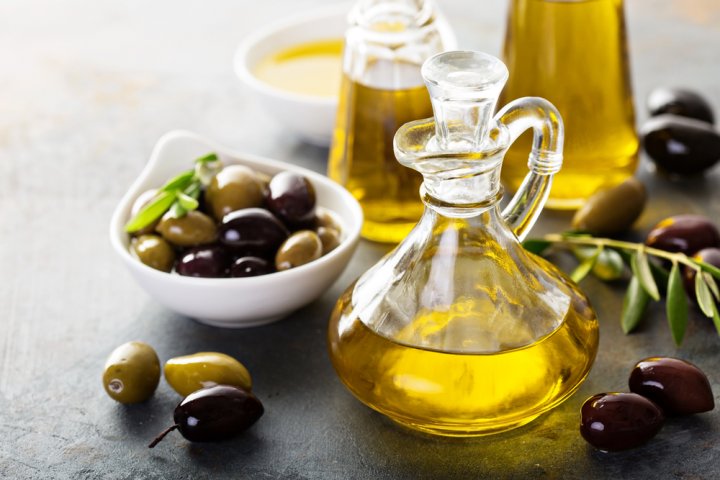
Olive oil is the winner against coconut oil due to various qualities. Mediterranean diet is considered to be the healthiest diet in the world and olive oil is a major part of it. This diet is known to reduce the risk of heart disease, cancer, diabetes and help with weight maintenance. Olive oil has higher amounts of good fat such as monounsaturated and polyunsaturated fatty acids compared to coconut oil.
Olive Oil vs. Coconut Oil – Which is Better for Hair?

Olive oil moisturises the scalp better as it has thicker consistency and works well even on thick and curly hair. It is also a great after-bath hair serum and keeps the hair shiny and smooth. Olive oil treats dandruff and nourishes the scalp. It also soothes scalp burns, wounds and creates a relaxing effect.
Coconut oil contains vitamin-E, minerals and protein that moisturise and nourish your hair from the roots. It treats hair problems such as lice infestation, dandruff, fungal infection, eczema and bacterial infection. It helps to keep the hair shiny and frizz-free. It is great to slow down hair fall and boost hair growth. Coconut oil also works well against hair damage, split-ends and breakage. It also serves as a natural hair conditioner.
Which is the Better Option?
Coconut oil is usually used in the household as it is low-cost compared to olive oil. If you are looking for a hair oil to treat hair conditions like eczema and lice infestation then coconut oil is the best option, but if you looking for a better finish and nourishment then olive oil is a better option as it gives thicker coverage.
Olive Oil vs. Coconut Oil – Which is the Best for Skincare?

Olive oil, extra virgin olive oil has been used since ages by women and is a proven natural skincare product. It has antioxidants and hence the best anti-ageing oil. Olive oil works great against various skin conditions and helps to treat them. It reduces stretch marks, however there is no proven study to show whether it prevents stretch marks.
Coconut oil takes more time to penetrate the skin and nourish it though it has saturated properties. It leaves the skin greasy after use, but it is a very good moisturiser for those with dry skin in particular. Coconut oil has antibacterial properties and strengthens the skin barrier by anti-inflammatory response. It also boosts the production of collagen, which is responsible for skin elasticity.
Which is a Better Choice?
Coconut oil and olive oil, both are great for the skin and it is not justifiable to just recommend one of them as the best. They both have distinctive properties and work well to attain a healthy skin in different ways. Coconut oil is better at inducing the production of collagen compared to olive oil. Coconut oil is also known to improve skin health, moisturise and control bacterial infections compared to olive oil. If you are looking for treatment for these, then coconut oil is the best option. Olive oil on the other hand is great for stretch marks and for treating sunburn due to its strong antioxidants.
Olive Oil vs. Coconut Oil – Which One is a Good Option for Cooking?
Frying: Olive oil is stable when heated at high temperatures in comparison with coconut oil due to its strong antioxidant property, fatty acids and anti-inflammatory properties. Olive oil is better for frying due to its low smoke point and is healthier. Coconut oil has a higher smoking point compared to olive oil. It is also a stable oil for cooking due to its resistance to oxidation and it comprises 92% saturated fat.
Heart Health: Olive oil has more of good fat like monounsaturated and polyunsaturated fats than coconut oil. It contains 5-10 times the amount of good fat that is required by the body for consumption. It has a lower amount of saturated fat than coconut oil. This reduces the risk of cholesterol and coronary artery disease. In terms of calories, olive oil contains 120 calories in one tbsp of oil. Though the calorie content is less and it contains good fat, it is important to consume it in moderation as too much of good fat is also bad.
Coconut oil contains antioxidants and decrease oxidative stress in the body. It also lowers inflammation and maintains better heart health. Polyphenols are present in coconut oil, which are known to reduce blood pressure and growth of plaques in the arteries. Coconut oil increases enzymes that help to break down fat and boost production of bile. These properties help in better digestion and fat removal. It also helps to reduce bad cholesterol levels. Coconut oil has shown remarkable results in studies as it aids weight loss by calorie burning properties. This is possible due to the presence of 60% medium chain fatty acids in coconut oil, which are used as energy sources by our body.
Which is a Better Oil to Cook?
Olive oil is a better oil to cook considering both its cooking properties and health benefits. 1 tbsp of coconut oil contains 6 times more saturated fat than 1 tbsp of olive oil. So, olive oil is better and it also reduces the risk of heart diseases.
-
 From Usage in Skincare to Treating Wounds Quickly, Castor Oil Has a Lot of Applications You May Have Never Heard of: Benefits of Using Castor Oil (2021)
From Usage in Skincare to Treating Wounds Quickly, Castor Oil Has a Lot of Applications You May Have Never Heard of: Benefits of Using Castor Oil (2021)
-
 Make the Miraculous Neem Oil a Part of Your Daily Life: Discover the Numerous Uses of Neem Oil and How It Can Give You a Radiant Skin, Lustrous Hair and Overall Health and Wellbeing! (2021)
Make the Miraculous Neem Oil a Part of Your Daily Life: Discover the Numerous Uses of Neem Oil and How It Can Give You a Radiant Skin, Lustrous Hair and Overall Health and Wellbeing! (2021)
-
 Ever Considered Neem Oil for Hair? Here is Why You Have to in 2020!
Ever Considered Neem Oil for Hair? Here is Why You Have to in 2020!
-
 5 Best Neem Oil That Will Improve Your Skin with Regular Use Plus What Neem Oil Has to Offer for Our Healthy Skin in 2020
5 Best Neem Oil That Will Improve Your Skin with Regular Use Plus What Neem Oil Has to Offer for Our Healthy Skin in 2020
-
 Have You Ever Thought of Using Olive Oil for Something Other than Cooking or Eating(2020)? 10 Olive Oils for Smooth and Radiant Skin
Have You Ever Thought of Using Olive Oil for Something Other than Cooking or Eating(2020)? 10 Olive Oils for Smooth and Radiant Skin
Both Olive Oil and Coconut Oil Have Tremendous Benefits
As would have been evident by now, both olive oil and coconut oil have tremendous benefits for your health and wellness. So, depending on the specific requirement, you can decide which oil to use and derive maximum benefit from it. We hope you would have loved this BP Guide. Stay connected with us for more such engaging content.

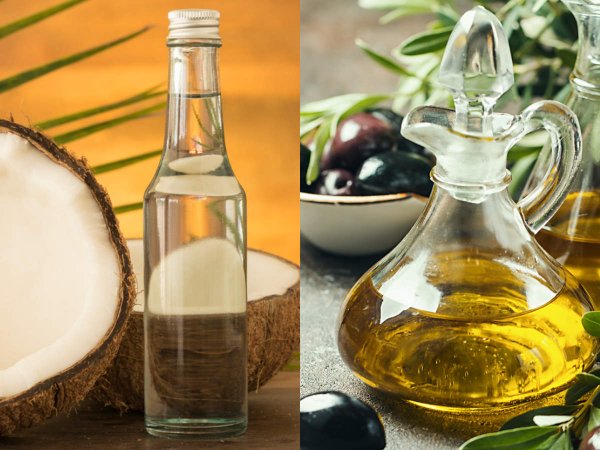
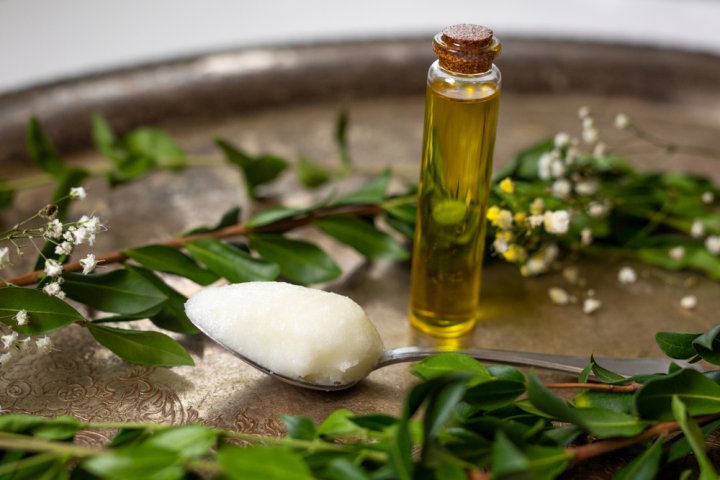
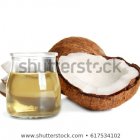








 Highlight the Best Facets of Your Incomparable Beauty: Discover the Best Face Highlighter Currently Available in India and Everything You Need to Know About Using Face Highlighters for Maximum Effect (2023)
Highlight the Best Facets of Your Incomparable Beauty: Discover the Best Face Highlighter Currently Available in India and Everything You Need to Know About Using Face Highlighters for Maximum Effect (2023)
 Forget the Blemishes and Get that Picture Perfect Flawless Radiance on Your Face: Check out the Best Foundations for Oily Skin Currently Available in India and Everything You Need to Know About Makeup Foundations (2023)
Forget the Blemishes and Get that Picture Perfect Flawless Radiance on Your Face: Check out the Best Foundations for Oily Skin Currently Available in India and Everything You Need to Know About Makeup Foundations (2023)
 Make Your Presence Felt Wherever You Go: Discover the Best Perfumes Under 2000 for Both Men and Women to Announce Your Arrival and Make Any Occasion Memorable (2023)
Make Your Presence Felt Wherever You Go: Discover the Best Perfumes Under 2000 for Both Men and Women to Announce Your Arrival and Make Any Occasion Memorable (2023)
 Protect Your Oily Skin from the Harmful Rays of the Sun: Discover the Best Gel Based Sunscreens for Oily Skin and Everything You Need to Know Before Buying One (2023)
Protect Your Oily Skin from the Harmful Rays of the Sun: Discover the Best Gel Based Sunscreens for Oily Skin and Everything You Need to Know Before Buying One (2023)
 Minor Blemishes and Wrinkles Affecting Your Confidence? Check out the Best BB Creams to Conceal Your Worries and Nourish Your Skin to Restore the Healthy, Radiant and Glowing Complexion Back Again (2023)
Minor Blemishes and Wrinkles Affecting Your Confidence? Check out the Best BB Creams to Conceal Your Worries and Nourish Your Skin to Restore the Healthy, Radiant and Glowing Complexion Back Again (2023)
